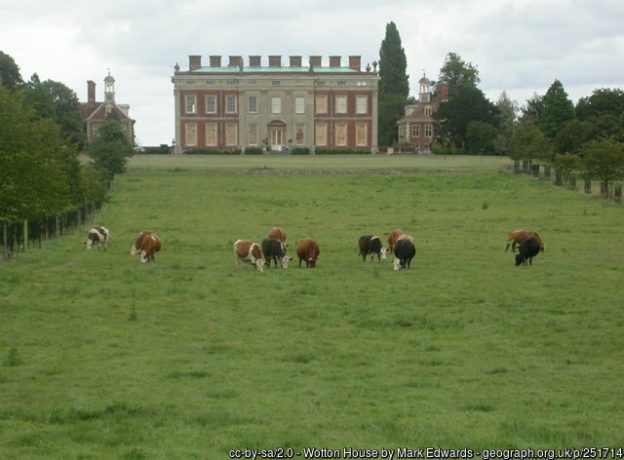Yes … wrenched pun heralds a note on the fact that yet another proprietary estoppel case has come out, Gladstone v White [2023] EWHC 329 Ch. Not a massively exciting one in terms of legal doctrine, but some things to notice about the judgment, and the ‘human interest’ reporting of the case in various parts of the press. And vaguely historical because it features an old stately home in Bucks …
Basic facts
The main contenders in the case were solicitor Leigh White and David Gladstone (a former diplomat, i.a. having been the High Commissioner to Sri Lanka). White claimed an interest in Gladstone’s land, (Wotton House, a Grade I listed ‘£15 million mansion’). White was, until recently, in the mansion and refusing to leave; she had been there since the pandemic, when Gladstone (a man in his late 80s) had moved out to self-isolate. He now wanted to come back and wanted her out.
There had been a close relationship between White and Gladstone, though there was disagreement as to whether this amounted to her being a ‘surrogate daughter’ (and thus just the person to be left the property) or her being rather more in the nature of a friendly and competent adviser (and thus not likely to expect to benefit in property terms).
So what happened? Read on …
The Legal Bit
Well … White’s claim was that she had an interest by virtue of proprietary estoppel. She said he had assured her that she would be left this interest, and she had acted to her detriment in reliance on it, so that it would be unconscionable for him not to give her the interest. He disagreed and wanted her out. On Gladstone’s side the argument was that there was no assurance which amounted to something White might reasonably have relied upon to her detriment, and not really any detriment, so no proprietary estoppel.[i] White lost on all fronts – and I don’t have anything very much to say about the law – it is applying the precedents in a fairly unsurprising way.
A long story
Several Land Law academics have commented on the length of this case – and, indeed, other proprietary estoppel cases. This one, from Trower J, weighs in at 123 pages. Many of us recently had to slog through 108 pages of Guest v. Guest. There is a genuine issue here, for teachers of Land Law – we all like the idea of students reading primary sources, of actually going to the case law, but it is becoming increasingly unrealistic to expect them to be on top of such long cases. (There are a few interesting points in another recent one, Mate v. Mate, a measly-by-comparison 92 pages, but that is not going on any of my reading lists). If it takes us a long time to get through one, we have to expect that it will take students, less (tragically) immersed in the background, and the other cases in the area, much, much longer. Obviously, judgments are not principally written for teaching purposes (unlike, we may think, the old Year Books) but I do wonder whether it is wholly necessary for them to be quite so discouragingly long.
As many of us work with assessment regimes with strict word limits for student answers, there does seem a particularly striking contrast between that insistence on efficiency of expression and the apparently complete lack of limits on the length of judgments. I wonder if the current generation of students, word-limited as they are, will produce shorter judgments when some of them rise to the heights of judgehood. Or will they take these cases as a challenge to produce ever longer judgments?
It certainly appears self-indulgent at times, to have 100 plus page judgments, and I do think that Guest could have benefited from some pruning. There is, perhaps, more reason to have longer judgments in lower courts, so as to set down all of the findings of fact, and the ‘workings out’, and to minimise the possibility of appeals and criticism on the basis that a first instance judge has not considered something or other, or not considered it properly. Still, it is a bit of a heart-sinker, seeing that you are on ‘p. 1 of 123’ in a judgment …
It could probably lose some of the narrative bits. Evidence of Gladstone’s ‘frail’ state of health was, of course, very relevant, as was White’s career as a solicitor, (first, because she was basing her case in having suffered detriment by giving it up to work at Wotton, and, secondly, because, given the knowledge of legal matters which it implied, it had implications for whether or not it was reasonable for her to rely on certain words as indicating that she would have a property interest). I am not sure that it was pertinent that Gladstone was ‘cultivated’ and ‘sensitive’ (34), or moved in ‘sophisticated circles’ (64), or the name of the architect who had done some revamping (even if that name is Ptolemy Dean. Ptolemy! Good Lord!). [And the suggestion that ‘David could be long-winded (128) may be thought to sit a little uninsightfully in a 123-page judgment….] So, we could do without some of the narrative elements, but nobody would want to redact the excellent passage in paragraph 421 in which we are treated to the exact wording of a quarrel in which somebody called White ‘a fucking nobody’ (though the judge does not use inverted commas, which does make it look rather as if the words are his.)
The coverage
Not that many Land Law cases find their way into the press. Not as exciting as big criminal cases, or Wagatha Christie style defamation cases, I suppose, but still, they do occasionally push the right journalistic buttons – different buttons for different papers. With this one, we have a mixture of:
- Wealth/prominence of the property owner (Millionaire ex-ambassador, or even ‘multimillionaire’)[ii] The Mail gives us the additional nugget that he was a descendant of William Ewart Gladstone (old families – marvellous …) and throws in the fact that Tony Blair and his wife Cherie Booth had bought ‘a former coach house’ on the estate (how very downmarket! And, at the same time, extravagant!)
- Value of the property (all accounts). Suspect it was this that drew in that well-known legal journal, the Tatler.
- The fact that the losing party was a lawyer (always a bit of schadenfreude when lawyers lose lawsuits, I think).[iii]
- The size of the legal bill faced by the losing lawyer (compounds, or adds an extra degree of piquancy to the schadenfreude felt by journalists, so it seems to me, anyway). £1 million is mentioned …[iv]
Only the Times, as far as I can see, went with a designation of ‘squatter’ for White. And, for a couple of points about Gladstone in his ambassadoring days, you’ll need to look at the Sri Lankan Times.
Anyway – law students, I am not sure I would bother plodding through this one: you have enough on with Guest v. Guest. It would be a rather good plot for a drama, though, should any TV or radio dramatists stumble upon this: class elements, stately home, tension, got to be Winslet as the lawyer-claimant, Nighy as the landowner; and a chance for a bit of a cameo from Michael Sheen as Tony Blair … come on, you know it makes sense.
GS
2/3/2023.
[i] (There were other things going on, to do with trusts and undue influence, but let’s keep it simple, and think just about Wotton and about the proprietary estoppel case).
[iv] See, e.g., Metro and Sun. In fact, this looks like a conservative figure, if my sums are correct!

